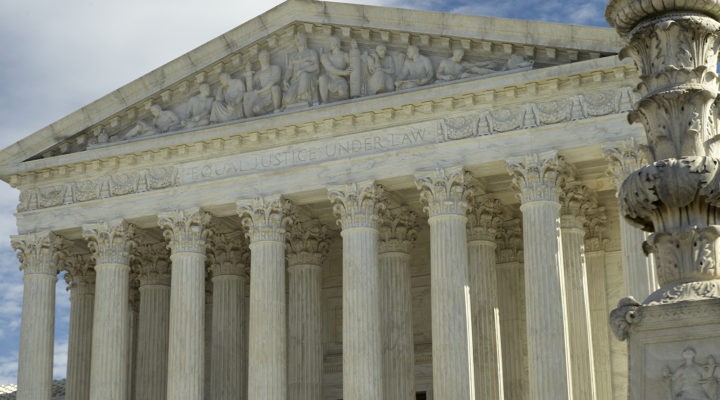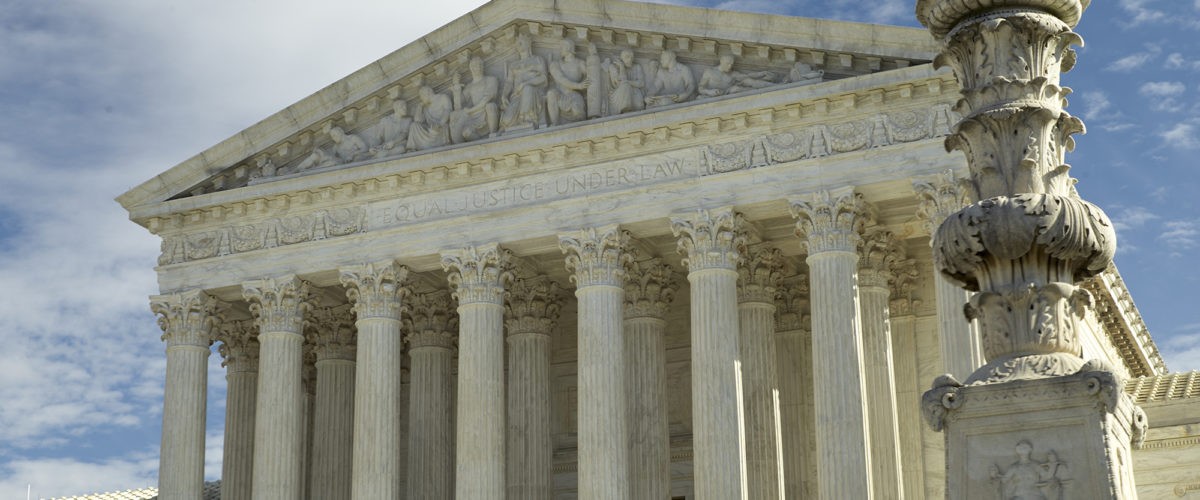There is no constitutional basis for abortion in America, and states should be able to regulate it without interference from the federal government, according to a court brief filed July 28 with the U.S. Supreme Court by the Southern Baptist Convention and the U.S. Conference of Catholic Bishops.
The friend-of-the-court brief, written by the Catholic bishops, is joined by the SBC’s Ethics and Religious Liberty Commission, as well as the Lutheran Church-Missouri Synod and the National Association of Evangelicals.
It comes in response to a Mississippi case, Dobbs v. Jackson Women’s Health Organization, the Supreme Court has agreed to hear in its next term. That case is widely anticipated to give the high court an opportunity to overturn or limit two previous court rulings that said the U.S. Constitution protects the right to have an abortion before a fetus becomes “viable.”
“The Constitution does not create a right to an abortion of an unborn child before viability or at any other stage of pregnancy.”
Mississippi passed a law that bans almost all abortions after the 15th week of pregnancy — a more limited standard than what federal law currently allows. Previous attempts by state legislators to enact stricter limits on abortion typically have been rebuffed by the Supreme Court, which has held to the standards set in the two previous landmark cases, Roe v. Wade and Planned Parenthood v. Casey.
However, in the last months of Donald Trump’s term as president, the composition of the high court tilted toward the most conservative majority in decades when Amy Coney Barrett was placed on the court to succeed the late Ruth Bader Ginsburg. Religious and political conservatives who have sought for decades to overturn Roe v. Wade believe this is the right moment to achieve their goal.
Although anti-abortion groups wanted the court to take a broader look at the Mississippi case, the court — after months of dithering — agreed to take up just one aspect: whether all “pre-viability” bans on elective abortions violate the Constitution.
“Viability” is a key concept in the abortion debate, since Roe v. Wade defined it as when a fetus has the potential to survive outside the uterus after birth, natural or induced, when supported by up-to-date medicine. Not only has such a definition created a moving target with advances in medicine, it also has opened the door for continuous debate.
What the bishops and Baptists say
In their brief, the Catholic bishops and Southern Baptists — not surprisingly — begin by declaring that the court’s previous key rulings on abortion were “deeply flawed” and “should be overruled.”
The Catholic bishops and Southern Baptists begin by declaring that the court’s previous key rulings on abortion were “deeply flawed” and “should be overruled.”
“The Constitution does not create a right to an abortion of an unborn child before viability or at any other stage of pregnancy,” the brief states. “Abortion is inherently different from other types of personal decisions to which this court has accorded constitutional protection. An asserted right to abortion has no basis in constitutional text or in American history and tradition.”
According to Catholic teaching, “life” begins at conception, and even the act of conception should not be hindered through contraception. Baptist beliefs on conception and abortion have been less rigid and have, in fact, changed over time.
In the 1960s it was not uncommon for even theologically conservative Southern Baptist pastors to support abortion rights in certain circumstances. Over time, however, as the SBC took a more rightward shift, its public positions on abortion came to more closely mirror those of the Catholics — with the major exception that Southern Baptists do not preach against contraception. That shift culminated this summer at the SBC annual meeting, where messengers overrode their own Resolutions Committee to adopt the most restrictive language ever approved by the SBC regarding abortion.
The court brief focuses on fetal viability as an “entirely arbitrary” measure that defies “principled justification.”
‘No constitutional basis’
A key argument of the Catholic-Baptist brief is that the Constitution offers no explicit support or allowance for abortion: “The Constitution does not create a right to an abortion of an unborn child at any stage of pregnancy.”
Therefore, court attempts to define viability and assess various timelines and circumstances in which abortions might be allowed are doomed to fail and to create confusion, the brief argues. “Neither constitutional text nor history provides support for an abortion right before viability or at any other stage of pregnancy.”
“Abortion involves the purposeful taking of an innocent human life and, like the homicide of a born person, it is a proper subject of prohibition by the state.”
Further, the brief argues that all abortion should be considered the murder of innocent human life: “Abortion involves the purposeful taking of an innocent human life and, like the homicide of a born person, it is a proper subject of prohibition by the state.”
The answer to this problem, the brief argues, is for federal courts to get out of the way and let elected legislators make laws restricting abortion.
“The abortion right is in conflict with the structural restraints (such as separation of powers and federalism) that leave important issues up to the people through their elected representatives, state and federal,” the brief explains. “The notion that it is the role of the federal judiciary, and not the elected branches of government, to decide such an important question of public policy as abortion conflicts with principles of popular sovereignty (consent of the governed) and separation of powers that lie at the very core of our constitutional government.
“The people’s chosen representatives, who by virtue of their election and relatively short terms remain accountable to the people, are vested with exclusive lawmaking power subject only to such constraints as the people themselves have agreed to place beyond the reach of political majorities. State governments remain the repository of all political power not specifically delegated to the federal government.”
While state legislatures have been eager to adopt laws related to abortion, the federal legislature has not. Most Congressional limitations on abortion have come through spending limitations, mainly those enforced by the Hyde Amendment.
“The way to prevent it is to return the issue to the states, where it properly belongs.”
Given the inability to restrict abortion through federal law, abortion opponents have turned repeatedly to state legislatures — which is the set-up for the current case now heading to the Supreme Court.
This cycle of states attempting to create abortion restrictions, only to have their new laws tied up in state and federal courts must stop, the brief declares: “The disastrous result is that nothing relating to federal court review of abortion regulations is ever truly settled. Even modest abortion legislation of a type previously upheld by this court is now subject to re-litigation in lower courts, state by state, based on different factual records.”
The brief concludes: “Ultimately these cases, with all the problems they entail for lower courts, land on this court’s doorstep. And under the current jurisprudence, it will never stop. This should not be. The way to prevent it is to return the issue to the states, where it properly belongs.”
Religious opinion and public opinion
The Supreme Court rarely considers public opinion in its rulings, ostensibly focusing on a precise interpretation of law. However, those appealing to the court often cite public opinion as a measure of their cause.
Such is the case with the Catholic and Baptist brief, which states that the two previous cases, Roe and Casey, “unlike other landmark decisions of this court, have never met with general acceptance by the American public. Roe and Casey have been subject to continuing criticism by judges and legal scholars, including those who self-identify as pro-choice.”
That assessment doesn’t square with polling data, however.
Gallup reported in September 2020, for example, that “nearly eight in 10 Americans believe abortion should be legal to some degree, and a majority don’t want Roe v. Wade overturned.” In the 2020 poll, Gallup found 29% of Americans believe abortion should be legal “under any circumstances,” 14% say it should be legal “under most circumstances” and 35% say it should be legal “only in a few circumstances.”
The percentage of Americans who align with the bishops and the Baptists? Gallup answers: “20% say it should be illegal in all circumstances.”
The percentage of Americans who align with the bishops and the Baptists? Gallup answers: “20% say it should be illegal in all circumstances.”
Pew Research recently reported even stronger American support for abortion rights. From its spring 2021 survey: “Around six in 10 U.S. adults (59%) say that abortion should be legal in all or most cases” while “39% say it should be illegal in all or most cases.”
The Pew report also stated: “While Americans’ support for legal abortion has fluctuated somewhat in recent decades, it has remained relatively consistent in the past five years.”
Similarly, Public Religion Research Institute reported in 2019: “Only 15% of Americans overall say abortion should be illegal in all cases, a number that has not changed since 2014. Notably, there is no state in which more than one-quarter of residents support a total ban on the legality of abortion.”
That’s not to say abortion isn’t a highly contentious issue. Gallup’s researchers noted: “The country is far from unified on the extent to which abortion should be legal.”
And Pew explained: “Though abortion is a divisive issue, about six in 10 U.S. adults do not take an absolutist position on abortion.”
Related articles:
SBC calls for ‘immediate abolition of abortion without exception or compromise’
Why we need to talk about abortion | Opinion by Russ Dean
When being ‘pro-life’ really isn’t: How I became a Democrat who opposes abortion | Analysis by Chris Conley


